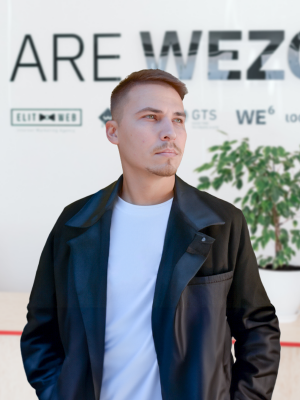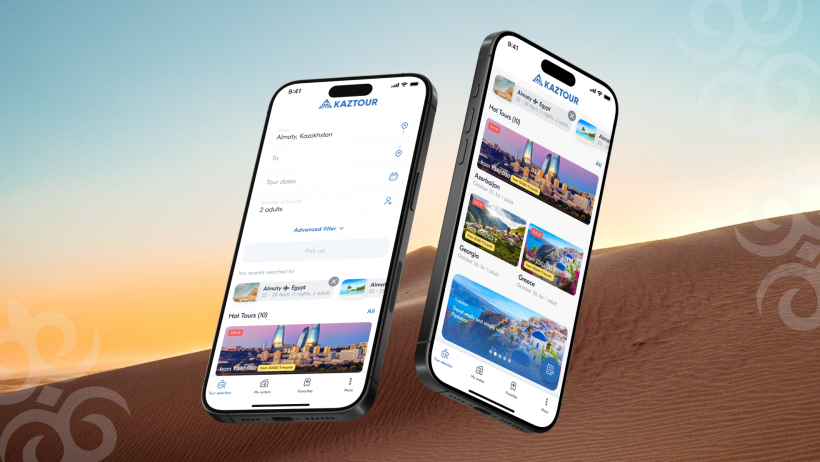What should be the modern tourism business sphere? It should take care of all the hassle of travel, leaving clients with the possibility of having quality rest only. Such a service should be convenient and accessible so that any user can instantly find and book the tour they need. This is exactly the experience that we have implemented in a new mobile app for a travel agency for our client – the Kaztour travel agency. Let's talk about this development in more detail.
Who was the customer?
Last year, a Kazakh company – the team of Kaztour travel agency team reached out to us. The business was established in 2001 and, initially, it was a family business. Today it is a national agency with offices throughout the country. During the period of more than 20 years on the market, around 40 thousand tourists became the clients of Kaztour.
Today, after recovering from the crisis in the industry, that was provoked by COVID-19, the agency is growing rapidly. The company offers a wide range of services: organizing travel to anywhere in the world (including complex routes), full visa support, and booking any transport – from train tickets to renting private jets.
The whole range of services needed digitizing, and the Kaztour team succeeded in many ways in this process by developing their site with a wide range of functions. However, further travel app development in the digital world required developing their own application, so, as this initiative requires relevant experience and a team of specialists, the client approached the WEZOM team.
What was the challenge?
By the time the Kaztour approached us, they already had a working website. The request was to create a corporate travel agency app. This tool was supposed to replicate the functionality of the site, but at the same time would have its own “tricks”, like a bonus program.
So, the main goal of the project was to create a cross-platform mobile app for both Android and IOS. The realization of this goal required covering several needs:
- To develop and approve the UI/UX design of a mobile application for the target OS.
- To realize the mobile application for tours technically.
- To enable the integration of the application with the clients’ APIs and the whole necessary set of tools: online maps, geolocation, payment systems, etc.
After finalizing the concept of the project, we could move to choosing the technology stack and forming the team for making the travel agency app itself.

What technologies were used in the development?
For creating cross-platform tour apps, we use the Flutter framework. It is based on the Dart language and provides developers with a range of benefits, including:
- The combination of possibilities provided by AOT and JIT compilation.
- The Hot Reload mechanism.
- A simple and convenient SDK with a lot of libraries and adjustable widgets.
- A huge, rapidly growing community that relies on the support of Google.
All of these benefits make the process of development faster and more simplified, thus making the final price of the product lower.
In addition to that, apps built on Flutter work with the help of a virtual machine with its own graphic engine for interface reproduction. It allows for enabling high fluidity of animations and this is true even for devices with a display updating frequency of 60 or 120 Hz. This means, on this framework, you can build effective online services that also have unique designs!
What approach to work did we use?
After choosing the main technologies for development, the team started organizing the processes within the project. We follow the Agile methodology and Scrum methodics which implies a flexible and iterative approach to development and short sprints that include 2-3 weeks of work each.
All the tasks related to development were included in the backlog depending on the level of priority and distributed among sprints. The project was realized using the efforts of a small but dedicated team, consisting of such specialists:
- A project manager.
- A UI/UX designer.
- A mobile developer.
- A QA engineer.
This team took on the tasks of creating prototypes, developing and approving the design mockups, and, finally, developing the app itself.
Reporting and Communication
We always ensure complete transparency in our projects - the development team provides all documentation about the progress of work and always remains in contact with the client. Our partners from Kaztour are fully digitalized, so we could not only communicate with them in Telegram but also demonstrate the progress of work in Jira.
In addition, we presented the results of each sprint to clients, where we reported on the work done: demonstrated ready-made functional modules, shared plans for the future, and received feedback. This way, the client is always aware of the situation and progress on the project, and the development team understands the further direction of their work and the priority of tasks.
What we ended up developing
Our work resulted in a modern mobile application for a travel agency – stylish, convenient, and truly useful to the user. This solution runs on both Android and IOS and it is fully integrated with the clients’ backend. Now, let’s have a look at the possibilities our new product provides.
Comprehensive search, selection, and booking of tours
On the main screen, the user sees the tour search interface. Here, you can choose all the necessary parameters: the place of departure and destination (in particular using geolocation), date of departure, duration of trip, and number of tourists (for example, two adults and two children).
The filter allows you to filter out offers by budget, hotels, and All inclusive options. There is also a block of last-minute tours where you can find the best deals.

The creation of user profiles with documentation
The user can create tourist profiles in the travel agency app and upload passport/visa data to them so that they no longer have to enter them manually when booking new trips. This saves time and allows you to book a tour in just a couple of clicks. You can store multiple profiles in one account. For example, to book tickets for the whole family.
Installments and payment in parts
You can’t really surprise anybody with different payment options nowadays, but the client went further and integrated additional tools into its service. Users can select installment plans and loans to pay for the tour in the application, selecting one of the offers from partner banks.

Additional services
When booking a tour online, the user can immediately arrange additional services in the travel agent booking system: PCR testing, insurance for traveling abroad, transfer options, ordering a personal guide, etc. This simplifies the trip as much as possible and speeds up registration.

The “FAQ” block and feedback
The “FAQ” block is realized in the app so that the user can find answers to typical questions about booking tours. But if he or she does not find the necessary information, he or she can contact the tech support. To do this, a special form of connection through Telegram or WhatsApp is realized.

The application is constantly evolving, and a lot of new functionality is planned for future updates. In particular, the “Check-tour” mechanism, will allow users to track changes in prices for selected offers. Our immediate plans also include the implementation of a loyalty program: users will be awarded bonus points for booking tours, which will be used as cashback.
Difficulties that have been solved
One of the main problems for developers in the initial stages of the project was the usage of two separate APIs on the backend. These were the APIs used for the Internet and mobile versions. They had to be developed and updated separately, which made the process much more lengthy. Eventually, together with the client, we decided to go for one API and it allowed us to synchronize all of the functionality updates, accelerate the release, and simplify further support of the tour planning app.
One of the biggest issues of the project was design. The client's intention was to make the application design as identical as possible to the website layout, and as in travel agency software. But our team insisted that in mobile development, slightly different UX laws apply, so it’s worth reconsidering your views on design. Time has shown that this was the right decision, which benefited the entire project. We also quickly redesigned the application just two months after the launch of the first MVP, because the client redesigned the site in new colors.
Results of our project
In 5 months, the team developed a modern and advanced travel agency system for mobile use. This solution is available for users on both Android and IOS.
The release of the travel app in stores was quite successful. In 7 months since its release, the product has reached more than 13 thousand downloads on Android, and more than 22 thousand downloads on IOS. These are excellent indicators for the market in which the client operates.

Right after the release of the application, the team engaged in its active support, and now it is constantly working on updates. We arrange calls with the client twice a week and discuss the new functionality. On the Kaztour side, the team has a business analyst who prepares documentation for our developers. Subsequent product updates will focus on unique features that are only available in mobile format. In particular, we are talking about a new bonus program with cashback.
The work on Kaztour is an excellent example of how a travel app project in 2024 remains an indispensable tool for business development. It cannot be fully replaced by a website, instant messengers, or anything else. This is a means of building a unique user experience in the tourism industry, eCommerce, services, etc. If you base your application on the right ideas and entrust their implementation to a team of professionals, the result will always be worth it.

